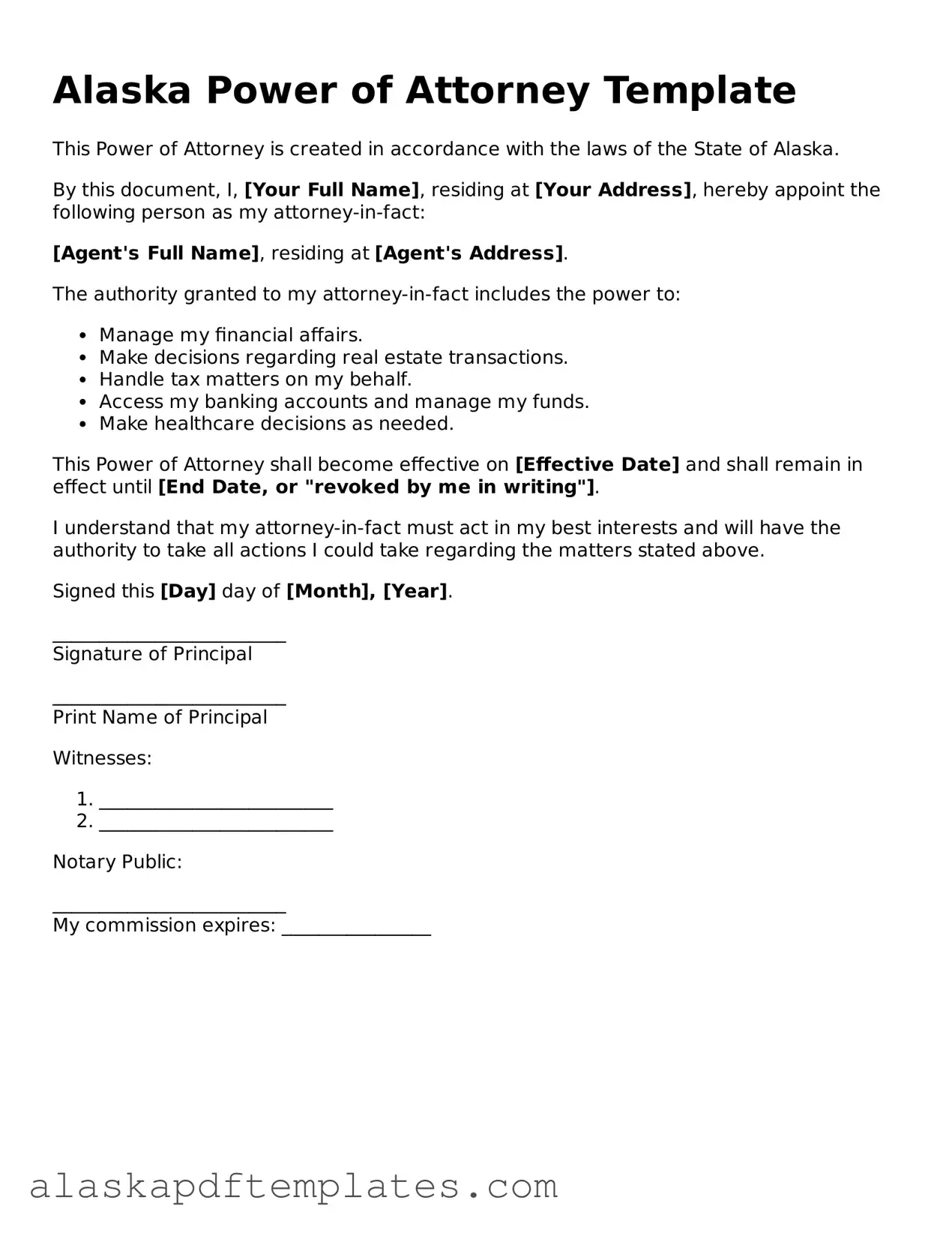Printable Power of Attorney Template for Alaska State
Fill out More Templates for Alaska
How Do You Graduate Homeschooling - By completing the Homeschool Letter of Intent, you illustrate your vision for a holistic educational experience.
Alaska Boat Bill of Sale - A Boat Bill of Sale should be filled out completely for effectiveness.
Filing your Affidavit of Service form properly is pivotal in ensuring that all parties to a legal action have been duly informed. This document plays a vital role in upholding legal standards and can prevent potentially significant complications in court proceedings.
Alaska Vehicle Bill of Sale - Can help prevent disputes over ownership or terms.
Similar forms
- Living Will: A living will outlines a person's wishes regarding medical treatment in situations where they are unable to communicate. Like a Power of Attorney, it is a legal document that reflects personal decisions about health care.
- Advance Healthcare Directive: This document combines a living will and a healthcare power of attorney. It allows individuals to specify their health care preferences and appoint someone to make decisions on their behalf if they are incapacitated.
- Official NYCHA Form: The NY Templates provide essential resources for understanding the Official NYCHA form, which assists tenants in navigating legal complexities and protecting their rights within the housing court system.
- Durable Power of Attorney: Similar to a standard Power of Attorney, a durable power of attorney remains effective even if the person becomes incapacitated. It ensures that financial and legal decisions can still be made when needed.
- Financial Power of Attorney: This specific type of power of attorney focuses solely on financial matters. It grants someone the authority to manage another person's financial affairs, similar to the broader powers granted in a general Power of Attorney.
- Trust Document: A trust document establishes a legal entity that holds assets for the benefit of others. Like a Power of Attorney, it allows for the management of assets, but it also provides specific instructions on how those assets should be distributed.
- Will: A will outlines how a person's assets should be distributed after their death. While it does not grant authority during a person's lifetime, it serves a similar purpose in expressing an individual's wishes regarding their estate.
Dos and Don'ts
When filling out the Alaska Power of Attorney form, it is important to follow certain guidelines to ensure that the document is completed correctly. Below is a list of recommended practices and common pitfalls to avoid.
- Do read the entire form carefully before filling it out.
- Do provide clear and accurate information about the principal and agent.
- Do sign the form in the presence of a notary public if required.
- Do keep a copy of the completed form for your records.
- Don't leave any blank spaces in the form; fill in all required fields.
- Don't rush through the process; take your time to ensure accuracy.
Guide to Writing Alaska Power of Attorney
Once you have the Alaska Power of Attorney form, it’s time to fill it out carefully. This form allows you to designate someone to make decisions on your behalf. Follow these steps to complete it accurately.
- Start with the title section. Write “Power of Attorney” at the top of the form.
- Fill in your full name and address. This is the person granting the power.
- Provide the name and address of the person you are appointing as your agent. This person will act on your behalf.
- Specify the powers you are granting. Be clear about what decisions your agent can make.
- Indicate the duration of the power. Decide if it’s effective immediately, or if it starts at a later date.
- Sign and date the form at the designated area. Your signature confirms your intentions.
- Have the form notarized. A notary public will verify your identity and witness your signature.
After completing the form, keep a copy for your records. It’s also wise to give a copy to your agent and any relevant parties. This ensures everyone is informed and ready to act when needed.
Documents used along the form
When creating a Power of Attorney in Alaska, several other forms and documents may be beneficial to ensure comprehensive management of your affairs. Below is a list of commonly used documents that complement the Power of Attorney form.
- Advance Healthcare Directive: This document allows individuals to outline their healthcare preferences in case they become unable to communicate their wishes. It can include instructions about medical treatment and appoint a healthcare agent.
- Residential Lease Agreement: When renting a property, it's essential to have a solid understanding of the comprehensive Residential Lease Agreement guidelines to protect both landlord and tenant rights.
- Living Will: A living will specifies the type of medical treatment a person wishes to receive or not receive in situations where they are terminally ill or incapacitated. This document is crucial for guiding healthcare decisions.
- Durable Power of Attorney: Similar to a standard Power of Attorney, this document remains effective even if the principal becomes incapacitated. It is particularly useful for long-term planning.
- Financial Power of Attorney: This form specifically grants authority to manage financial matters, such as banking, investments, and real estate transactions, allowing the agent to act on behalf of the principal in financial affairs.
- Will: A will outlines how a person's assets should be distributed after their death. It can also designate guardians for minor children and address other important matters related to estate planning.
Using these documents in conjunction with the Alaska Power of Attorney can help ensure that your wishes are respected and that your affairs are managed according to your preferences. It is advisable to consult with a legal professional when preparing these documents to ensure they meet your needs and comply with state laws.
